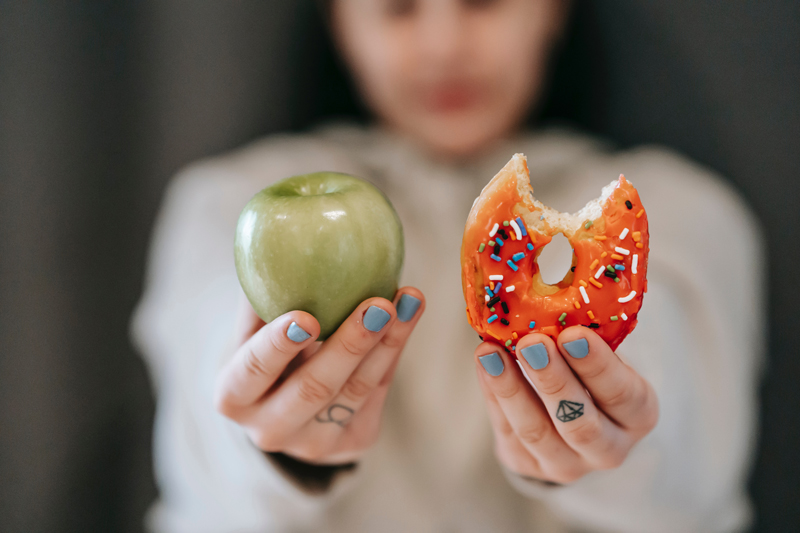
Many of us are well aware of the benefits that eating a balanced diet has on our physical health, but do you know how it benefits our mental health? More and more research is coming to light on the impact food has on both our overall mental wellness, as well as specific mental illnesses like depression and anxiety.
March is National Nutrition Month, so it’s a good reminder to take stock of your life and see how your nutritional habits are affecting your mental health and general well-being.
According to an article on nutrition and mental health on the Nutritionist Resource website, eating a diet that is well-rounded and nutrient-rich can help to improve mood, increase energy levels and help you think clearer. There are several elements at play here, from the number of carbohydrates you eat to the way deficiencies in vitamins and minerals affect mental health.
Here’s how Nutritionist Resource broke down the various factors at play when it comes to nutrition and mental health:

Carbohydrates and eating regularly
In order for your brain to be able to concentrate and focus, it needs energy (20% of all energy needed by the body is used by the brain). This energy comes from blood glucose, and the glucose in our blood comes from the carbohydrates we eat.
When we don’t have enough energy for the brain, we can feel weak, tired, and unable to think clearly. Ensuring you eat regular meals containing some carbohydrates will help with this. Alongside starchy foods like pasta and rice, sources of carbohydrates include:
- whole grains
- fruits
- vegetables
- legumes
- lower-fat dairy
When your blood glucose rises and falls rapidly, it can have an impact on mood, making you feel irritable, low and even triggering symptoms of anxiety. Keeping your blood glucose levels steady throughout the day is key. Try foods that release energy slowly like oats, cereals, nuts, and seeds, and aim to eat smaller portions spaced out throughout the day.

Proteins and fats
Alongside the energy it gets from carbohydrates, your brain needs amino acids to help regulate thoughts and feelings. As protein contains amino acids, it’s important to get enough of this in your diet. Protein is found in lean meat, fish, eggs, nuts and seeds, cheese, soy products, and legumes.
Some people may be under the impression that all fat is bad for us, but this isn’t the case. Fatty acids, like omega-3 and omega-6, are essential for our brains to function well. Healthy fats can be found in nuts, seeds, oily fish, poultry, avocados, dairy products, and eggs.
Vitamins and minerals
When we don’t get enough of certain vitamins and minerals, both our physical and mental health can suffer. The best way to ensure you’re getting enough of the vitamins and minerals you need is to eat a varied and balanced diet, rich in fruit and vegetables. For some, a supplement may be needed, but be sure to check this with your doctor or a nutrition professional.
Here are some examples of how different vitamin/mineral deficiencies can affect your mood:
Iron: A lack of iron can lead you to feel weak, tired, and lethargic. Foods rich in iron include red meat, poultry, fish, beans and pulses, and fortified cereals.
B vitamins: Not getting enough B1, B3 and B12 can make you feel low, tired, and irritable. Animal protein foods such as meat, fish, eggs, dairy, and fortified cereals are rich in B vitamins.
Folate: When you don’t get enough folate you can be at a higher risk of feeling depressed. Folate can be found in green vegetables, citrus fruits, liver, beans, and fortified foods like marmite.
Selenium: A selenium deficiency may increase the chance of feeling depressed and other negative mood states. Good sources of selenium include Brazil nuts, seeds, whole-meal bread, meat, and fish.
A helpful way to make sure your diet is nutrient-rich is to ensure you’re getting at least five portions of fruit and vegetables every day.

Gut health and mental health
The link between our gut health and our mental health is becoming clearer. Often dubbed the “second brain,” our digestive system produces over 90% of all serotonin (the “happy” hormone) in our body. Our gut can also affect immunity and resilience to stress, which can both have an effect on our mood. Having a healthy digestive system, in general, ensures we’re able to absorb vitamins, minerals, and nutrients our brains need to thrive.
Often, when we’re feeling stressed or anxious, we’ll feel it in our gut. Digestion may speed up or slow down, depending on how we’re feeling. To keep your gut happy, ensure you eat plenty of fiber and get lots of fluid and regular exercise.
Fermented foods can give the good bacteria in our gut a boost, so try to incorporate these into your diet where possible. Other gut-friendly foods include fruits, vegetables, whole grains, beans, lentils, and peas.

Medication and your diet
It’s worth noting that if you’re taking a certain medication for your mental health, there may be some foods you need to avoid. Be sure to speak to your doctor about any medications you’re taking and ask about any dietary changes you may need to make.
How a nutritionist can help
Mental health and wellness require a holistic approach. Eating a balanced diet that contains the nutrients your brain and gut needs can complement other therapies and approaches you’re using to manage mental health.
To ensure you’re getting the right foods for your particular circumstances, it can help to seek professional support from a nutritionist. They will be able to talk to you about your needs, take into account your individual requirements and tailor a diet plan to suit you.
“On the face of it, our diets may seem to be sufficient but our digestion, absorption, health history, and inherited health traits can affect the amount of nutrients our body needs,” says nutritionist Sarah Hanratty. “One or more of these factors can tip the balance towards poor mental health. A personalized approach to diet and lifestyle can also help you regain physical and mental well-being.”




